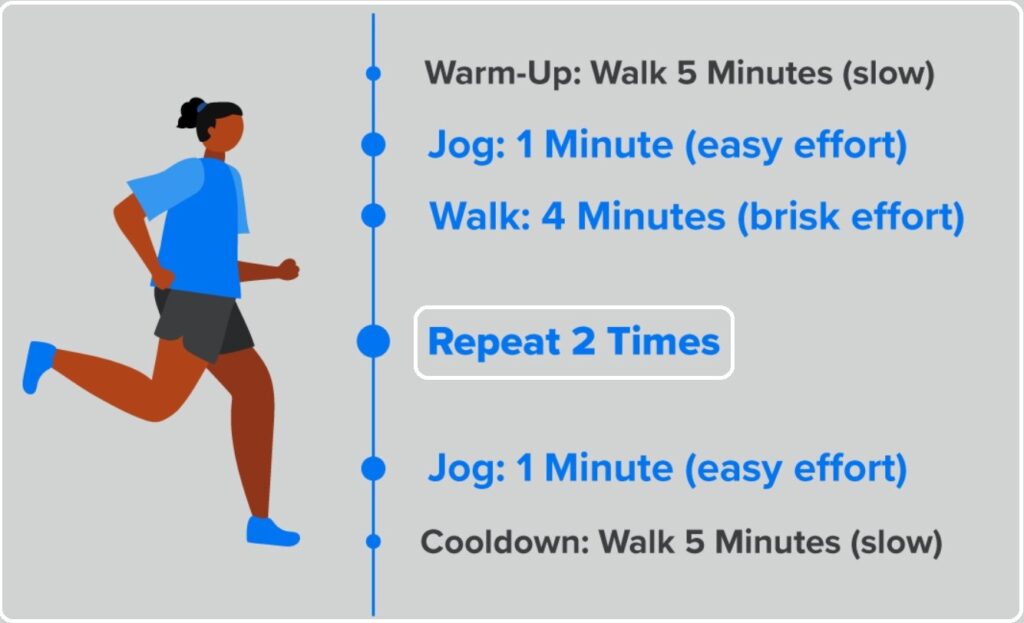Is Walking Effective for Weight Loss?
Yes, walking is effective for weight loss. Walking is an excellent form of low-intensity cardio exercise that helps to burn calories and promote weight loss.
Not only is it an easy and accessible activity to incorporate into your daily routine, but it can also be a fun way to enjoy the outdoors and get some fresh air. Regular walking has been shown to boost metabolism, improve cardiovascular health, and increase muscle mass.
Moreover, it can help to reduce stress levels, improve mood, and promote better sleep quality. Whether you’re looking to lose weight or simply maintain a healthy lifestyle, walking is a great choice for improving overall health and wellbeing.
Is Walking Effective For Weight Loss?
Walking is a popular form of exercise that is often considered a beginner-level activity. People from all walks of life choose walking as a way to maintain a healthy and active lifestyle. However, when it comes to weight loss, people often wonder if walking is an effective form of exercise.
Here, we will explore the effectiveness of walking for weight loss.
Walking For Weight Loss
Walking for weight loss is a low-impact, aerobic exercise that involves moving at a moderate pace for a set amount of time. This type of exercise can be performed anywhere, anytime, and requires no equipment or specific skills. Walking for weight loss can be done by people of all ages and fitness levels.
Scientific Explanation Of Walking’S Effects On Weight Loss
Walking for weight loss can be effective because it can help burn calories, and increase metabolism. When you walk, your heart rate increases, and your body burns calories to keep up with the increased demand for energy. Walking also helps to build muscle, which can further boost metabolism, leading to more calories burnt throughout the day.
Comparison Of Walking To Other Exercises For Weight Loss
When compared to other exercises such as running or cycling, walking is considered to be a lower intensity exercise. However, research shows that walking can be just as effective as these higher intensity exercises when it comes to weight loss.
Additionally, walking is a low-impact exercise, making it a safer option for people with injuries, arthritis, or other physical limitations.
Some Studies On Walking For Weight Loss
Studies have shown that walking can be an effective form of exercise for weight loss. A study conducted by the american heart association found that women who walked for 30 minutes a day, five times a week lost an average of 17 pounds in only six months.
Another study by the university of virginia found that people who walked for 30 minutes, five days a week, lost an average of 18 pounds over the course of a year.
Walking can be an effective way to lose weight. It is a low-impact and easy form of exercise that can be done by people of all ages and fitness levels. With regular walking, you can increase your metabolism, burn calories, and build muscle.
If you are looking for a simple and effective way to lose weight, walking is a great place to start.
Health Benefits Of Walking
How Walking Can Improve Overall Health?
Walking is a physical activity that is often overlooked when it comes to exercise routines. However, it is an excellent way to improve overall health. Walking is a low-impact and easy-to-do activity that can be done by anyone, regardless of age or physical ability.
It is also a great way to maintain a healthy weight, improve cardiovascular health, and boost mental health.
Various Health Benefits Of Walking Beyond Weight Loss
Walking has numerous health benefits that go beyond weight loss. Here are some of the most significant ones:
- Reduces the risk of chronic diseases: Walking regularly lowers the risk of chronic diseases such as heart disease, stroke, and type 2 diabetes.
- Improves cardiovascular health: Walking increases heart and lung efficiency, leading to improved cardiovascular health.
- Boosts mental health: Walking is a great way to reduce stress, anxiety, and depression. It also increases endorphin levels, leading to an improved mood.
- Enhances bone density: Walking is a weight-bearing exercise that improves bone density and decreases the risk of osteoporosis.
- Lowers the risk of certain cancers: Research has shown that walking regularly can lower the risk of certain cancers such as breast and colon cancer.
Why Walking Is A Great Exercise For All Age Groups?
One of the best things about walking is that it is a suitable exercise for all age groups. Here’s why:
- Low impact: Walking is a low-impact exercise that is gentle on the joints, making it perfect for older adults who may have joint pain or arthritis.
- Highly adaptable: Walking can be adapted to any fitness level. Even low-intensity walking can provide significant health benefits.
- Easy to incorporate into daily routine: Walking is an easy activity to incorporate into a daily routine. It can be done at any time, anywhere, and does not require any special equipment.
- Cost-effective: Walking is a cost-effective way to improve health, as it requires nothing more than a good pair of shoes.
Walking is a highly beneficial exercise that offers numerous health benefits beyond just weight loss. It is also an activity that can be done by anyone regardless of age or physical ability. By incorporating regular daily walks into one’s routine, it is possible to significantly improve overall health and well-being.
How Walking For Weight Loss Works?
Walking is a low-impact aerobic exercise that burns calories and can help with weight loss. Here are some key points to consider regarding walking for weight loss:
- Walking can help people burn calories and fat, which results in losing weight.
- The number of calories burned while walking depends on the speed and distance covered. A brisk walk for at least 30 minutes every day can help people lose weight.
- Walking also boosts metabolism, which can help people burn more calories throughout the day.

The Different Factors That May Affect Walking’S Effectiveness For Weight Loss
While walking can be an effective form of exercise for weight loss, several factors can impact its effectiveness. Here are some key points to consider:
- People who are overweight or obese may need to walk for longer periods or more frequently to see the desired weight loss results.
- Walking on inclines or uneven terrain can increase the intensity of the exercise and help people burn more calories.
- People who have a sedentary lifestyle may need to increase the duration and frequency of their walking sessions gradually.
- Incorporating strength-training exercises while walking can help people build more muscle and increase their metabolism, which can boost weight loss.
Tips To Maximize Walking Potential For Weight Loss
There are several tips people can follow to maximize walking’s potential for weight loss. Here are some key points to consider:
- Setting a goal and tracking progress can help people stay motivated to continue walking for weight loss.
- Increasing the intensity of the walk by incorporating intervals of faster walking or jogging can increase calorie burn and help with weight loss.
- Walking with a friend or joining a walking group can make the workout more enjoyable and help people stay committed to their fitness goals.
- Wearing comfortable and supportive footwear can help people avoid injury and make the walking workout more effective.
Incorporating Walking Into A Weight Loss Plan
Walking is a low-impact form of exercise that can be easily incorporated into a weight loss plan, making it an excellent option for those looking to shed some extra pounds.
How Walking Fits Into A Weight Loss Plan:
- Walking can help burn calories, leading to weight loss.
- Walking can also increase metabolism and improve overall fitness.
- Walking can be done at any time and requires no special equipment, making it an accessible option for anyone.
Create A Walking Routine For Optimal Weight Loss:
- Set a goal for how many steps to take each day and gradually increase over time.
- Incorporate intervals of faster walking or inclines to increase intensity.
- Schedule walking sessions into your daily routine to make it a habit.
Tips For Incorporating Walking Into Everyday Life:
- Park further away from your destination to increase steps taken.
- Take the stairs instead of the elevator.
- Go for a walk during your lunch break or after dinner.
Use Technology To Track Progress:
- Use a pedometer or fitness tracker to monitor steps taken and calories burned.
- Tracking progress can provide motivation and help set new goals.
Incorporating walking into a weight loss plan can be a simple and effective way to achieve weight loss goals. By creating a routine, incorporating walking into everyday life, and tracking progress, weight loss can become more manageable and enjoyable. So, grab a comfortable pair of walking shoes and start taking those steps towards a healthier you!
Frequently Asked Questions
How Does Walking Help With Weight Loss?
Walking is a low-impact aerobic exercise that can help burn calories and improve metabolism. It also reduces appetite, improves blood sugar, and promotes muscle growth, all of which contribute to weight loss. Start with a daily brisk walk to see the results.
How Long Should I Walk To Lose Weight?
The amount of walking required to lose weight depends on various factors, such as your age, weight, and fitness level. To start, aim for at least 30 minutes a day and gradually increase it up to an hour or more.
Remember to also maintain a healthy and balanced diet.
Is Walking Alone Enough To Lose Weight?
While walking can contribute to weight loss, it is not enough on its own. It should be combined with a balanced and nutritious diet, strength training, and other forms of exercise for optimal results. Additionally, consult with a medical professional before starting any exercise program.
Conclusion
Walking is indeed an excellent way to initiate weight loss, and it is perfect for individuals who struggle to lose weight with rigorous exercise routines. It requires no special skills, equipment, or gym memberships, making it an affordable and convenient option for everyone.
Walking enhances metabolic rate and promotes a healthy heart while also effectively assisting in reducing body weight. However, the effectiveness of weight loss depends on several factors like walking intensity, frequency, and duration. It is crucial to maintain consistency with walking as well as a balanced diet to achieve significant results.







